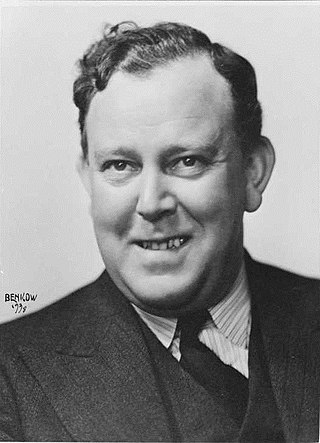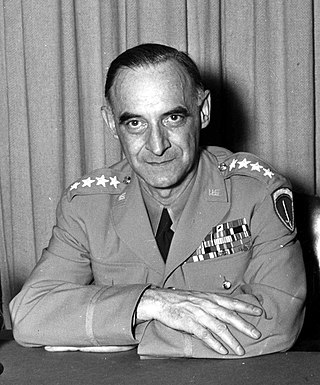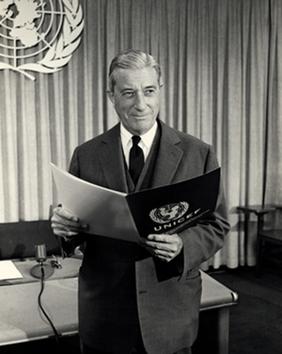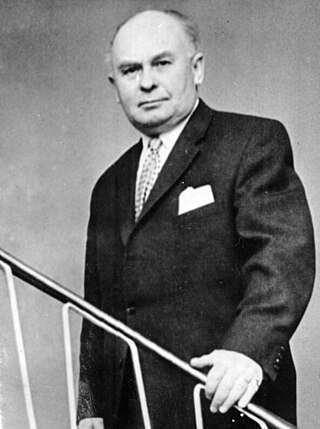
Karl Heinrich Knappstein (15 April 1906 Bochum - 6 May 1989 Bad Homburg) was a German journalist, diplomat, and German Ambassador to the United States, from 1962 to 1968. [1] [2]

Karl Heinrich Knappstein (15 April 1906 Bochum - 6 May 1989 Bad Homburg) was a German journalist, diplomat, and German Ambassador to the United States, from 1962 to 1968. [1] [2]
He studied law, economics and sociology at the universities of Cologne, Bonn, Berlin, Geneva and Cincinnati (Ohio). From 1937 to 1943, he was editor of the Frankfurter Zeitung, from 1945 to 1948, he served as Assistant Secretary in the Hesse Ministry for political liberation, and from 1948 to 1950, he was chief press officer of the Board of Directors of United Economic Area.
From 1950 to 1951, he worked at the West German Consulate General in New York, in 1951 he was appointed consul general in Chicago. In 1956, he was ambassador in Madrid (Spain), from 1958 to 1960 he was Deputy Secretary of State at the Foreign Office, and from 1960 to 1962 he was an observer of the Federal Republic to the United Nations.
He was involved in discussions on the Berlin crisis, [3] and on the multilateral nuclear force, with respect to the Élysée Treaty signed by Konrad Adenauer and Charles de Gaulle . [4]

Trygve Halvdan Lie was a Norwegian politician, labour leader, government official and author. He served as Norwegian foreign minister during the critical years of the Norwegian government in exile in London from 1940 to 1945. From 1946 to 1952 he was the first Secretary-General of the United Nations.

Lucius Dubignon Clay was a senior officer of the United States Army who was known for his administration of occupied Germany after World War II. He served as the deputy to General of the Army Dwight D. Eisenhower in 1945; deputy military governor, Germany, in 1946; Commander in Chief, United States Forces in Europe and military governor of the United States Zone, Germany, from 1947 to 1949. Clay orchestrated the Berlin Airlift (1948–1949) when the USSR blockaded West Berlin.

Ernst Heinrich Freiherr von Weizsäcker was a German naval officer, diplomat and politician. He served as State Secretary at the Foreign Office of Nazi Germany from 1938 to 1943, and as its Ambassador to the Holy See from 1943 to 1945. He was a member of the prominent Weizsäcker family, and the father of German President Richard von Weizsäcker and physicist and philosopher Carl Friedrich von Weizsäcker.

Charles "Chip" Eustis Bohlen was an American diplomat, ambassador, and expert on the Soviet Union. He helped shape United States foreign policy during World War II and the Cold War and helped develop the Marshall Plan to rebuild Europe.

Henry Richardson Labouisse Jr. was an American diplomat and statesman. He was the third Director of the United Nations Relief and Works Agency for Palestine Refugees in the Near East (UNRWA) from 1954 to 1958. He was the director of the United Nations Children's Fund for years (1965–1979). He was also a member of the Council on Foreign Relations. A lawyer, he was United States Ambassador to France 1952–1954, as well as United States Ambassador to Greece 1962–1965. Labouisse had been the principal United States Department of State official dealing with the implementation of the Marshall Plan.

Hans Kroll was a German career diplomat and after World War II ambassador in Belgrade, Tokyo and Moscow.

Sir Frank Kenyon Roberts was a British diplomat. He played a key role in British diplomacy in the early years of the Cold War, and in developing Anglo-German relations in the 1960s.
Vladimir Ivanov Georgiev (1908–1986) was a prominent Bulgarian linguist, philologist, and educational administrator.

The Berlin Crisis of 1961 was the last major European political and military incident of the Cold War concerning the status of the German capital city, Berlin, and of post–World War II Germany. The crisis culminated in the city's de facto partition with the East German erection of the Berlin Wall.
Walter Cecil Dowling was the United States Ambassador to West Germany from 1959–1963 and the US Ambassador to South Korea from 1956-1959.

Karl-Günther von Hase was a German diplomat and Secretary of state. As head of the Press and Information Office of the Federal Government, he served as spokesman of government under three chancellors. He was ambassador to the United Kingdom from 1970 to 1977. He was then Director General of the ZDF, a German public-service television broadcaster, retiring in 1982.

August Rudolf Lindt, also known as Auguste R. Lindt, was a Swiss lawyer and diplomat. He served as Chairman of UNICEF from 1953 to 1954 and as United Nations High Commissioner for Refugees from 1956 to 1960.

Francis Joseph Meehan was an American diplomat who served as the United States Ambassador to several of the Eastern Bloc states during his career. His final posting was as United States Ambassador to East Germany.

Everett Francis Drumright was an American diplomat who served in a variety of posts, including as U.S. Ambassador to the Republic of China (Taiwan).
Public Affairs Press was a book publisher in Washington, D.C., owned and often edited by Morris Bartel Schnapper (1912–1999).

Stanisław Skrzeszewski was a Polish communist politician, educator and prominent statesman of the Polish People's Republic.
Horst Grunert was a German diplomat who served as the second Ambassador of East Germany to the United States from 1978 to 1983 and as ambassador to Austria from 1983 to 1986.

Feridun Cemal Erkin (1899–1980) was a Turkish diplomat and politician. He was the minister of foreign affairs between 1962 and 1965. He served as the ambassador of Turkey in various countries, including Italy, the United States of America, Spain, France and the United Kingdom.